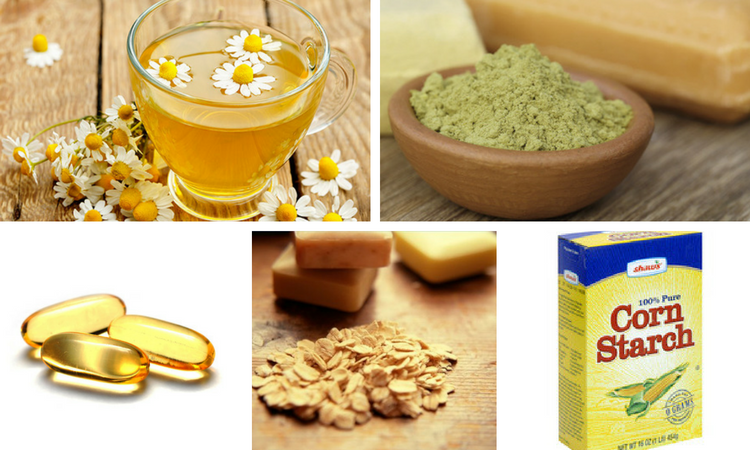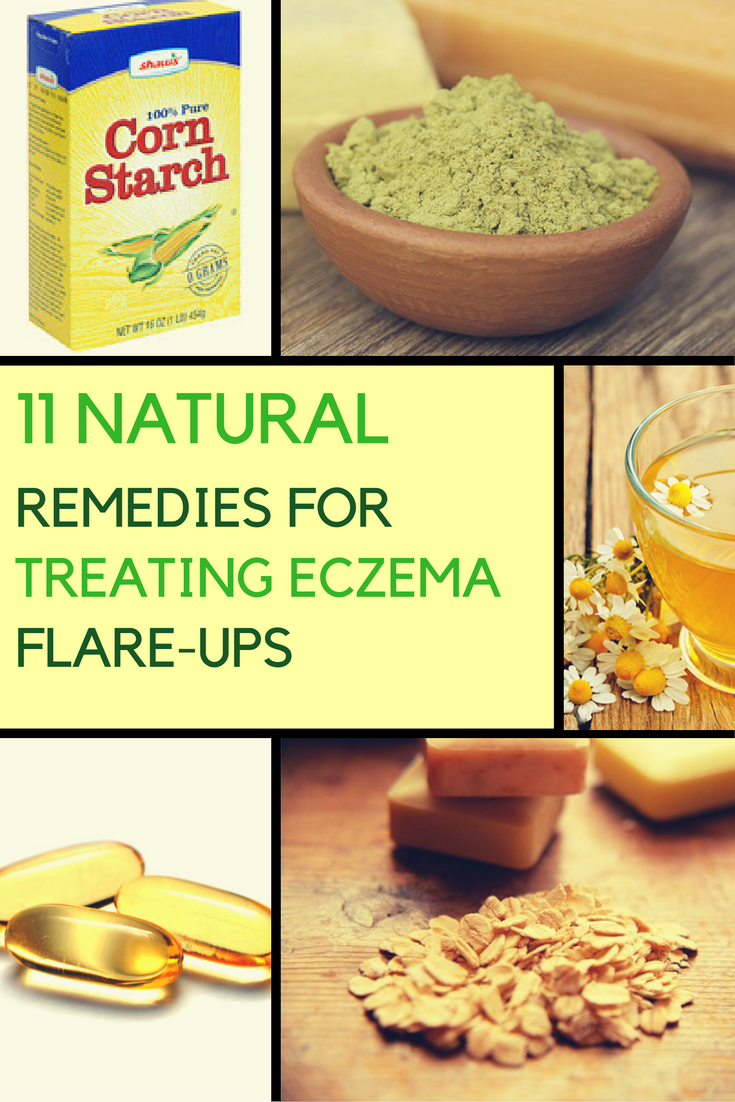
[adinserter block=”1″]
Eczema is a skin condition that can make your skin very dry and very itchy. Some of the most common places that people get eczema is on their elbows, knees, ankles, cheeks, and necks.
There are several conditions that can cause eczema. Some of these include:
- Atopic dermatitis
- Irritant dermatitis
- Stasis dermatitis
- Fungal infections
- Scabies
There are also several different types of eczema that are caused by different irritants and have different symptoms.
The most common symptoms of eczema include flaky skin, itchy skin, extremely dry skin, cracking skin, blisters, and oozing puss.
Many people who have eczema will go see the doctor to get a prescription for a topical medication. If you want to avoid chemicals and drugs, there are several ways that you can treat eczema on your own, at home.
Not only can you treat the condition naturally, you won’t need to worry about taking time out of your day to see a doctor.
[adinserter block=”4″]

Coconut Oil
Coconut oil is a great treatment for eczema because it can easily sink deep into the skin. Also, it can fill up the intercellular spaces, which is where the moisture in your skin is able to escape when you have eczema.
Finally, it is loaded with oils and fats. These will keep your skin from drying out and becoming itchy and irritated.
To treat your eczema with coconut oil, you would simply purchase the oil at your local heath food store and rub it into the affected areas. Allow the oil to dry. You can apply the coconut oil to your skin whenever necessary.
Recommended: Carrington Farms Organic Extra Virgin Coconut Oil
Jojoba Oil
Jojoba oil works great in treating eczema, however, it actually isn’t an oil. It is actually a liquid wax. This is what makes it such a good home remedy.
It is able to penetrate the skin very deeply, even deeper than coconut oil. Another reason that jojoba oil is such a great home remedy is that of all the oils available, it is the closest to the natural sebum oil that we have in our skin which keeps it moist.
Jojoba oil is very moisturizing because is is made up of fatty alcohols, fatty acids, and oils. Some people avoid this treatment because they hear that it contains fatty alcohols.
This is something you don’t need to worry about. The fatty alcohols in jojoba oil is not the type that is drying, like isopropyl and benzyl alcohols.
To use jojoba oil to treat your eczema, you would need to put just a little bit of the product on your finger and rub it into the affected area. Continue to massage it into your skin until it is partially absorbed.
Because the oil is so rich and thick, you won’t be able to rub it in completely like you would with a traditional oil. You should apply the jojoba oil to your eczema three times a day.
Recommended: Leven Rose Organic 100% Natural Jojoba Oil
Soothing Homemade Butter
If you want to moisten the dry, itchy areas of your body where you have eczema, you should make a soothing butter. Every ingredient in this recipe is not only natural, but they are also very soothing.
To make this butter, you will need:
- 2 tablespoons of shea butter
- 2 tablespoons of beeswax
- 6 tablespoons of coconut oil
- 4 tablespoons of jojoba oil
- Lavender essential oils
- Air tight containers
Instructions:
Using a double boiler, met the jojoba and the beeswax completely. When they are melted, add the coconut oil and let it melt completely. Lower the heat and add the shea butter a little bit at a time.
Pour the mixture into an airtight container and add two drops of lavender essential oil. Allow the butter to cool and then apply it to the affected areas.
[adinserter block=”2″]
Oatmeal Bath
An oatmeal bath is a great home remedy for eczema. Not only will it help with the dry skin and the inflammation, it will also help with the discomfort. Oatmeal is great because it has anti-inflammatory properties.
To prepare the oatmeal bath, you will need:
- 1 cup of plain oatmeal
- Cheesecloth
- Rope
Instructions:
To prepare your bath, pour the oatmeal into the cheesecloth, and use a piece of rope to tie the cloth closed. Next, tie a longer piece of rope to the cheesecloth so that you can hang it under the faucet.
Fill the bathtub halfway. When the bath fills, the water will be smooth and milky. Take the bag down, and let it soak in the tub. Get in the tub and soak for 15 to 20 minutes.
Chamomile Tea
Chamomile tea is great for the skin if you have eczema. Not only will it reduce the inflammation, it will also stop the itching and it will soothe the areas that are irritated due to scratching.
Chamomile tea has anti-microbial effects. This will kill any germs and bacteria that have taken advantage of the weakness that the eczema caused in your skin.
To treat eczema with chamomile tea, you will need:
- 4 tablespoons of dried chamomile flower
- Cheesecloth
Instructions:
To take a chamomile tea bath, you would do it the same way as the oatmeal bath. Put the chamomile flower in the cheesecloth and hang it from the faucet. As the tub fills, the tea will come out of the cloth.
If you want a stronger bath, you can add 4 tablespoons of tea directly to the tub. Soak for 15 minutes, and pat your skin dry. You should follow up with a moisturizer to protect your skin after your bath.
Fish Oil Supplements
Studies have shown that fish oil can help with the inflammation of eczema as will as the itching. It is loaded with N6 and N3 fatty acids, which are necessary for normal skin function.
You can use either the liquid form of fish oil or the capsule form. If you choose to use the liquid form, you should mix it with a glass of orange juice. It makes it much easier to take.
Recommended: Dr. Tobias Omega 3 Fish Oil Triple Strength 180 Caps
Honey
Honey is a great home remedy for eczema because it can relieve a variety of issues. It is an anti-inflammatory, which will keep the redness and swelling down. It is an anti-microbial, which will protect the skin from infection.
Also, it helps speed up the healing process if the skin is broken. Finally, it is great at soothing the itch. The only downside is that is sticky. This remedy is best to use on small areas. When you use honey, be sure to use raw, organic honey.
After you apply the honey, you can cover it with a thin bandage if you like. Leave it on for 30 minutes, and then rinse it off with cold water. You should use the honey treatment three times a day.
Cornstarch and Oil
If you have ever mixed cornstarch and water, you will know that it turns into a cool putty. You want to create a cool putty, but you cannot use water. It will draw the moisture away from the skin.
Instead, you want to mix cornstarch with oil, such as olive oil or grapeseed oil. When you combine the two, it will turn into a spreadable paste. You should leave the paste on the affected areas for 20 minutes. Wash the paste off with warm water and pat the area down with a dry towel.
You should notice a huge difference as soon as your remove the paste. When the area is dry, apply your regular moisturizer to the area.
French Green Clay
When you have eczema, you will often scratch. As hard as you try not to, you may not be able to help it. When you scratch, the relief is minimal. Soon, the skin will break, causing a sore.
When you scratch the sore it will open up and then scab over again. It is a vicious cycle, which makes eczema such an uncomfortable condition.
One excellent treatment for the itching, pain, and inflammation is French green clay. It is loaded with potassium, calcium, iron, and many other minerals which will treat the symptoms of eczema.
To make this soothing clay, you will need:
- ½ cup of French green clay
- Witch hazel extract
Instructions:
In a small bowl, combine the French green clay and enough of the witch hazel to create a creamy paste. Apply the paste to the affected area and let it dry completely.
When the paste is dry, wash it off with warm water and pat your skin dry with a clean towel. You should notice a huge difference in your skin as soon as the paste has been rinsed off.
You can use this home remedy twice a day to keep the inflammation down and keep the itching and pain away.
Apple Cider Vinegar
Apple cider vinegar is great for the skin. Not only does it work as a disinfectant, it also helps to soothe the inflamed skin that is caused by eczema. If you have eczema in just a small area, you can use cotton balls to apply the apple cider vinegar.
If you have it in a large area, you can use a paper towel. Dip it in one part apple cider vinegar and one part water. If your eczema has caused your skin to crack and bleed, this may not be the best home remedy for you.
If the skin is broken, the vinegar will make the area sting and it can become even more irritated. If the skin is just red and inflamed, the apple cider vinegar will work wonders.
Recommended: Bragg Organic Raw Apple Cider Vinegar
Tea Tree Oil
Tea tree oil is one of the most effective eczema remedies. It has anti-inflammatory properties and anti-microbial properties. This will keep the swelling and the itchiness at bay and it will also keep the area from becoming infected.
When the skin is weakened by the eczema, it is susceptible to germs and bacteria. To use tea tree oil, you should put a few drops in a small bowl and dilute it with a bit of olive oil.
Apply it to the affected area several times a day. After a day or two, you should notice that the eczema is getting better and better.
Recommended: Radha Beauty Tea Tree Essential Oil
Uses These Natural Remedies to Treat Eczema
Eczema is not a serious skin condition, however, it can create very serious symptoms. If you scratch too much, the area can become infected, which will lead to an infection.
If you don’t want to use chemicals or medications on your skin, any of the above home remedies for eczema remedies will help treat the condition and its symptoms.
[adinserter block=”5″]